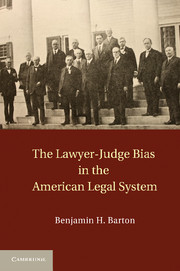Book contents
- Frontmatter
- Contents
- Acknowledgments
- 1 An Ambient Bias
- 2 The Theory
- 3 Constitutional Criminal Procedure
- 4 Civil Constitutional Law
- 5 A Short History of Lawyer Regulation
- 6 Current Lawyer Regulation
- 7 Torts
- 8 Evidence and Civil Procedure
- 9 The Business of Law
- 10 Enron's Sole Survivors
- 11 Complexity and the Lawyer–Judge Bias
- 12 Rays of Hope, Ramifications, and Possible Solutions
- Index
- References
2 - The Theory
Published online by Cambridge University Press: 03 May 2011
- Frontmatter
- Contents
- Acknowledgments
- 1 An Ambient Bias
- 2 The Theory
- 3 Constitutional Criminal Procedure
- 4 Civil Constitutional Law
- 5 A Short History of Lawyer Regulation
- 6 Current Lawyer Regulation
- 7 Torts
- 8 Evidence and Civil Procedure
- 9 The Business of Law
- 10 Enron's Sole Survivors
- 11 Complexity and the Lawyer–Judge Bias
- 12 Rays of Hope, Ramifications, and Possible Solutions
- Index
- References
Summary
We propose the general hypothesis: every industry or occupation that has enough political power to utilize the state will seek to control entry. … Crudely put, the butter producers wish to suppress margarine and encourage the production of bread.
– George StiglerInstitutions are the rules of the game in a society or, more formally, are the humanly devised constraints that shape human interaction.
– Douglass NorthTHERE WAS A TIME WHEN JUDGES WERE VIEWED AS INFALlible, their decisions a natural and required result of an immutable divine or customary law. Judges did not weigh the law, equities, and facts to reach a decision; instead, they simply and correctly applied fixed principles of law without error or uncertainty. Judicial authority and decision making were very much intertwined with religious authority; there was a general sense that infallibility flowed naturally from judges, whose authority and wisdom came directly from God and the monarch.
Since that time, it has become clear that law is a human creation, and that the judges who interpret and create that law are fallible. Nevertheless, some of the trappings of judicial majesty and infallibility remain. The Supreme Court meets in a massive stone building that resembles an ancient Greek temple. Judges wear robes and carry gavels. Bailiffs call “all rise” when judges enter the court, and judges are still called “Your Honor.”
- Type
- Chapter
- Information
- The Lawyer-Judge Bias in the American Legal System , pp. 21 - 38Publisher: Cambridge University PressPrint publication year: 2010



